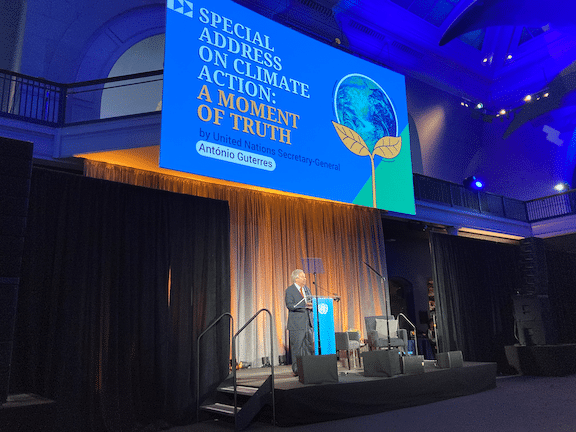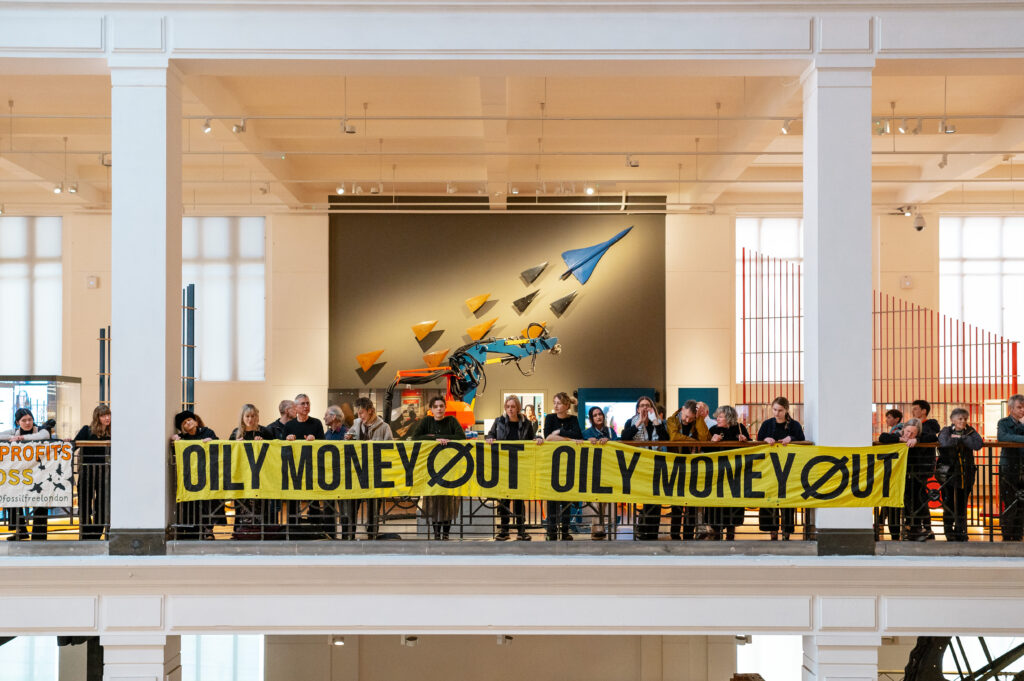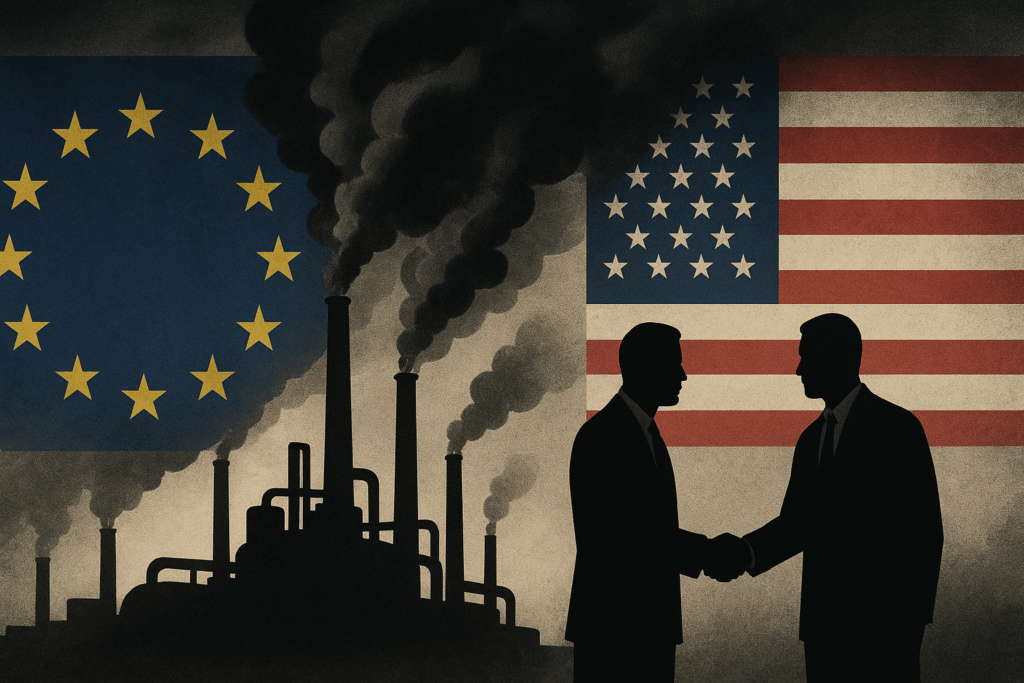United Nations Secretary-General Antonio Guterres has called on governments to ban fossil fuel advertising and warned creative agencies to stop working for the industry.
“Many in the fossil fuel industry have shamelessly greenwashed, even as they have sought to delay climate action — with lobbying, legal threats, and massive ad campaigns,” Guterres told an event at New York City’s American Museum of Natural History.
“They have been aided and abetted by advertising and PR companies — Mad Men fuelling the madness,” Guterres said, speaking in the museum’s Hall of Ocean Life, which is dominated by a 94-foot-long blue whale model suspended from the ceiling. “I call on these companies to stop acting as enablers to planetary destruction. Stop taking on new fossil fuel clients, from today, and set out plans to drop your existing ones.”
The announcement builds on a warning that Guterres issued in September, 2022, when he told the U.N. General Assembly that the advertising and public relations industry was harming its own reputation by working for oil and gas.
“Fossil fuels are not only poisoning our planet — they’re toxic for your brand,” Guterres said. “Your sector is full of creative minds who are already mobilising around this cause. They are gravitating towards companies that are fighting for our planet — not trashing it…I urge every country to ban advertising from fossil fuel companies.”
Campaigners hailed Guterres’ remarks as a watershed moment.
“There is no longer any cover for agencies to say that they are doing the right thing when working with polluters,” said Clean Creatives director Duncan Meisel. His is one of several groups working to highlight the advertising industry’s role in shielding fossil fuel companies from pressure to slash their emissions of planet-heating carbon dioxide.
Femke Sleegers, of Reclame Fossielvrij (Fossil Free Advertising), made similar points, and added that “ahead of the EU elections, we urge leaders to heed Antonio Guterres’ call for a ban on fossil fuel advertising.”
A ‘Tobacco-style’ Ban
The global advertising industry has been slow to acknowledge its true climate impacts, campaigners say.
The industry is dominated by six major holding companies: Omnicom Group, WPP, Interpublic Group (IPG), Publicis Groupe, Dentsu and Havas. These companies, the UK-based Advertising Association, and the World Federation of Advertisers did not immediately respond to requests for comment.
All six holding companies have joined Ad Net Zero, an industry initiative whose members pledge to voluntarily reduce in-house emissions generated by their own business operations, such as employee travel, energy used to power office buildings, and the production of advertising campaigns. Five of the six have set dates to achieve carbon neutrality, while Omnicom has set an interim target to reduce its emissions.
However, Ad Net Zero’s five-step action plan does not ask members to consider the wider risk that producing campaigns that enhance the images of heavily-polluting clients could deflect pressure to cut greenhouse gas emissions.
“It’s crazy that someone with as much power as the U.N. secretary-general can see clear as day that fossil fuel companies are as bad for business as they are for the planet”, said an employee at an Omnicom agency, who asked not to be named for fear of professional repercussions, “but comms agencies continue with their double-think.”
What’s needed, said Freddie Daley, from the University of Sussex and the Cool Down – Sport For Climate Action Network is “a ‘tobacco-style’ ban” that would encompass fossil fuel advertising across TV, radio, and outdoor billboards.
‘Lies and Deception’
Major advertising firms and industry trade bodies have criticised fossil fuel advertising bans adopted by a number of cities, arguing that the creative industry can play a role in steering polluting clients towards more climate-friendly business models.
Experts in climate misinformation reject this claim, however, arguing that advertising firms have played an outsized role in delaying climate action by portraying coal, oil and gas companies as green.
“It’s about time the PR industry, especially the large multinational conglomerates, are called out for their role in moving fossil fuel propaganda,” said Kert Davies, director of special investigations at the Center for Climate Integrity.
In late May, after the Edinburgh City Council voted 15-2 to ban advertising for “high-carbon products and services” such as airlines, cruise ships, and sport utility vehicles, that “undermine the council’s commitment to tackling the climate emergency”, industry trade bodies took a different approach: highlighting the economic losses to the city.
“This kind of action by councils simply reduces the revenue available to fund public services for their communities,” Tim Lumb, director of Outsmart, told Campaign, “and denies the right for many companies to legally advertise their products and services, which provides jobs and incomes to thousands of people up and down the country.” Outsmart is the trade body for the outdoor advertising industry.
However, the council passed the ban despite knowing that it could cut ad revenues by £200,000 a year. “It’s just basic common sense that if the council is serious about its commitment to climate justice, we cannot allow council advertising space to be used to promote fossil fuel companies,” Scottish Greens councillor Ben Parker told Campaign.
“These firms make millions on contracts from oil companies and other polluters who strive to continue business as usual as the world burns,” said Davies. “Lies and deception are the heart of the climate crisis. It’s time to stop them.”
Partnering with Trusted Brands
As the scope of climate accountability begins to extend beyond fossil fuel companies to include their partners in advertising and public relations firms, content created by the in-house advertising studios of major media is also coming under growing scrutiny.
In December, a joint DeSmog-Drilled investigation and report detailed how brand studios at the Financial Times, Reuters, The New York Times, The Washington Post and other trusted media are creating a wide range of content for the oil and gas industry, ranging from videos and podcasts to sponsored newsletters, advertorials, and events.
Documents subpoenaed as part of a Congressional investigation into the fossil fuel industry’s decades of deceptive advertising provided a rare unvarnished glimpse last month into the strategic value the oil industry places on these multi-million-dollar sponsorship deals.
Oil major BP, for example, considers such deals as key to influencing the Washington power players who set U.S. energy policy, according to documents made public as part of the investigation, and reported by DeSmog.
“The marketing, advertising and PR industries play a pivotal role in building the social license of major polluters,” said Lucy von Sturmer, founder and CEO of Creatives for Climate. By urging ad and PR agencies to “apply their persuasive powers to accelerating clients on genuine clean transition plans,” Guterres “has underscored the unique capability of the sector to drive rapid behaviour change and this is both a call out and a call in to act.”
‘Misleading Impression’
Guterres’ call for an ad ban comes as the world’s top international oil companies plan major expansions of oil and gas production, according to a May report from the non-profit advocacy group Oil Change International. They include Chevron, ExxonMobil, Shell, TotalEnergies, BP, Eni, Equinor, and ConocoPhillips.
These increases, if they became reality, would push global temperatures well beyond 1.5 degrees Celsius (3.6 degrees Fahrenheit) above pre-industrial levels, the target that nations backed in 2015’s Paris Agreement.
In a recent survey by The Guardian of hundreds of climate scientists, 80 percent said they believed that the world is already on track for at least 2.5 degrees Celsius (5.4 degrees Fahrenheit) of heating during this century.
“The companies that have done the most to cause the climate crisis are not showing any signs that they are genuinely acting as good faith partners in solving it,” David Tong, global industry campaign manager at Oil Change International, told DeSmog in an interview.
“So it’s not a surprise – it’s a positive step forward – for Antonio Guterres to now call for a ban on fossil fuel advertising,” he said.
Documents released through the recent U.S. congressional investigation into fossil fuel industry deception revealed that major oil and gas companies have little faith that the world will take the steps needed to avoid catastrophic climate change.
“We don’t yet see the world even approaching a 2 deg C pathway…let alone a 1.5 deg C pathway,” an Exxon official wrote in a 2018 email obtained by the investigation. “[B]oth 2 deg C and 1.5 deg C would require unprecedented changes to the global energy system and economy, at a rate and scale never before demonstrated.”
Yet the company was “employing advertising firms to loudly tout their [carbon capture and storage] efforts as evidence that ExxonMobil is participating in the energy transition in good faith,” Lindsey Gulden, a data scientist formerly employed by ExxonMobil, told DeSmog. Meanwhile, the company acknowledged internally that the technology could only play a “limited role” in fighting climate change.
This sort of false advertising creates “a misleading impression that they [fossil fuel companies] are transitioning their business models,” said Oil Change International’s Tong, “to preserve their social licence, their ability to access finance, their access to regulators and decision-makers.”
Subscribe to our newsletter
Stay up to date with DeSmog news and alerts






